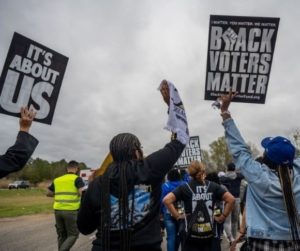The idea of a third political option like the Libertarian Party gaining traction in the United States has seemed laughable over the past century with Republicans and Democrats firmly ensconced in the nation’s zeitgeist. Both camps have held a stranglehold over American politics for ages and have even collaborated to prevent the rise of possible competitors who might challenge their favored status quo. But as Americans become increasingly dissatisfied with the government and even more disillusioned with their parties, there just might be an opening. Libertarians are banking on this possibility.
 The Mises Caucus – which took over the Libertarian Party two years ago – recently revealed its Decentralized Revolution campaign, which focuses on targeting local races all across the nation to begin building influence in various localities. As it embarks on this journey, it will have to appeal to a wide swath of Americans, the most elusive of which will likely be black voters, 90% of whom have been supporting Democratic candidates for decades.
The Mises Caucus – which took over the Libertarian Party two years ago – recently revealed its Decentralized Revolution campaign, which focuses on targeting local races all across the nation to begin building influence in various localities. As it embarks on this journey, it will have to appeal to a wide swath of Americans, the most elusive of which will likely be black voters, 90% of whom have been supporting Democratic candidates for decades.
Historically, the GOP has struggled to win the support of this voting bloc, mostly due to a lack of engagement. While there are people in the party trying to turn this around, change appears to be coming at a sloth-like pace, which creates an opening for Libertarians, who seem to have a better synergy with African Americans when it comes to many of the issues they consider critical.
Crime and Punishment
The issue of crime and the criminal justice system ranks high among black voters, who are disproportionately impacted by illegal activity in their communities. Coupled with severe problems in policing and other areas of law enforcement, these issues have caused a myriad of troubles for African Americans.
Democrats tend to take a softer approach to cracking down on crime while focusing on members of law enforcement who abuse their authority. Republicans, on the other hand, lean towards a “law and order” approach that involves more police tackling all types of crime occurring in these communities. Libertarians hope to win on this issue by striking a balance between both stances. A foundational tenet of libertarianism is that crime should be defined as “actions of force or fraud against another individual or group.” They believe acts that do not involve force or fraud should not be criminalized or penalized in the first place.
Policies in line with this philosophy would decrease interactions between police and civilians, thereby lowering the chances of encounters that lead to abuse. Moreover, as ardent opponents of the “war on drugs,” Libertarians argue that they can protect black citizens from being unfairly targeted for arrest and conviction for behaviors that should not be considered criminal. This would free up officers to focus more on violent offenses that have devastated many predominantly black and Hispanic communities.
Black Economics

(Photo by Brandon Bell/Getty Images)
Racial disparities in attaining generational wealth are also front and center for black voters. The Jim Crow laws, as well as other discriminatory policies, past and present, have placed unfair and unnecessary obstacles in front of African Americans that have historically made it difficult to earn more income and generate wealth through education and business ownership.
Excessive economic intrusion by federal, state, and local government has placed a heavier burden on black Americans than on other demographics. Regulations, onerous taxes, and unnecessary licensing requirements are only a few of the issues that have made it harder for black entrepreneurs to start and grow their businesses. These factors have a deleterious impact on employment in the black community as well.
“Libertarians advocate removing unproductive regulation, reducing and eliminating taxes, and getting government out of the way of innovation and job creation,” according to the party’s platform.
If the party’s candidates can connect with black voters and effectively articulate this message, it may go a long way toward making inroads in these communities. This is especially true with African American men, who have a distinct entrepreneurial bent, preferring to make a living outside of the traditional corporate environment.
Can Libertarians Connect with Black Americans?
These are only a few of the issues black Americans consider important. If Libertarians can effectively address these concerns and provide alternatives in the form of policy, they could persuade blacks to give them a chance.
The outcomes of the midterm elections revealed that African Americans are becoming increasingly disillusioned with the Democratic Party and are starting to rethink their political options. An increasing number have gravitated toward the GOP while even more decided not to vote. This presents an opportunity for Libertarians vying for local seats. The question is: Will the party be ready to do the work involved in winning over these voters?
Do you have an opinion about this article? We’d love to hear it! If you send your comments to [email protected], we might even publish your edited remarks in our new feature, LN Readers Speak Out. Remember to include the URL of the article along with your name, city, and state.
Please respect our republishing guidelines. Republication permission does not equal site endorsement. Click here.

